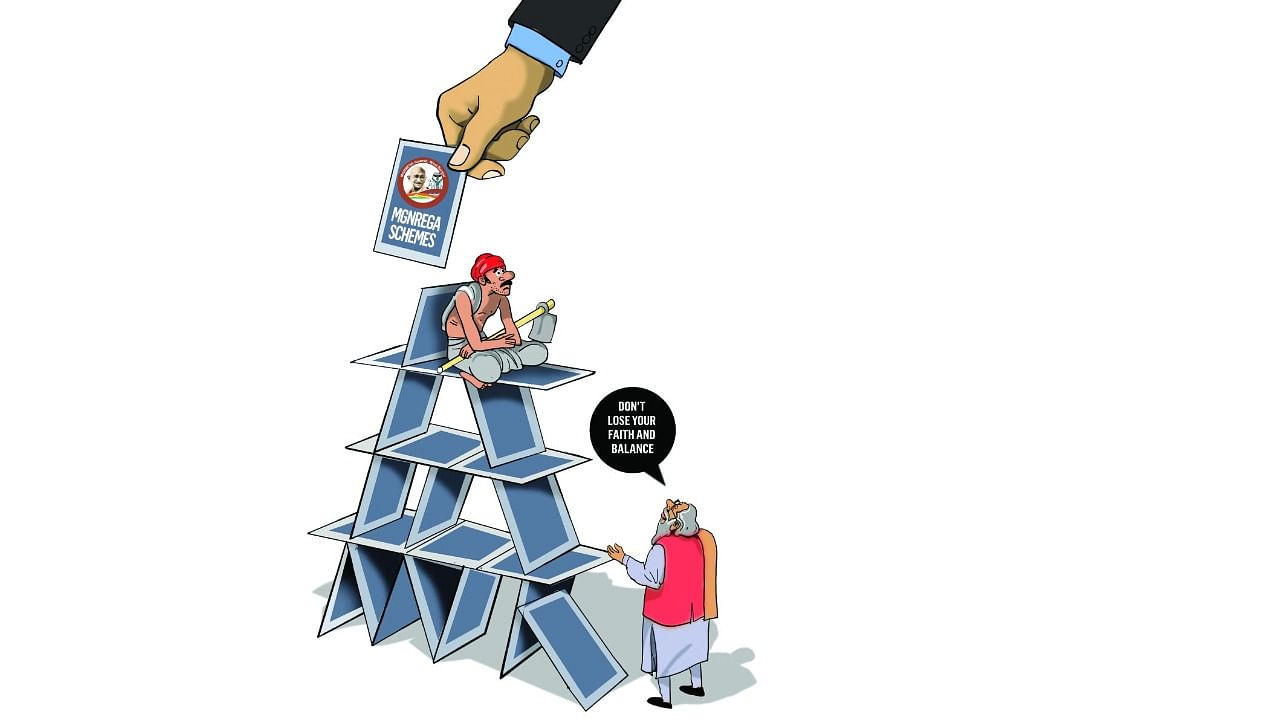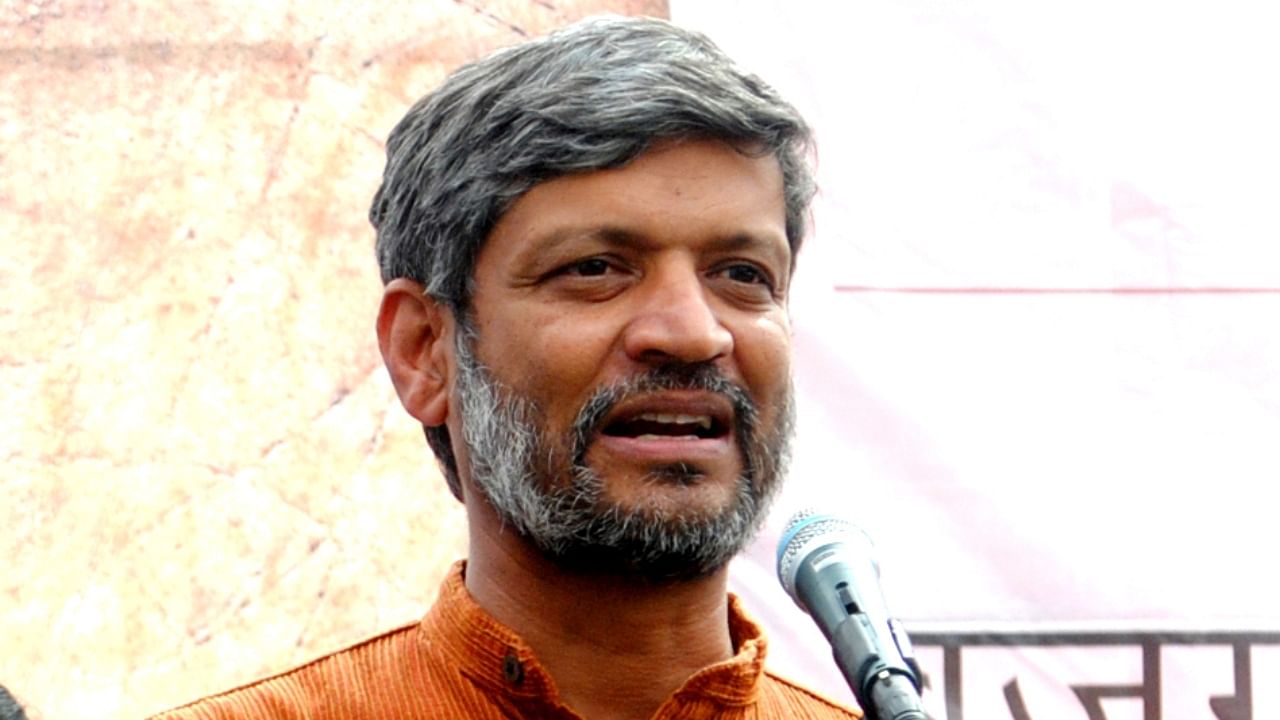

The Union Budget 2023-2024 dealt a body blow to the Mahatma Gandhi Rural Employment Guarantee Act (MGNREGA). Finance Minister Nirmala Sitharaman has proposed to earmark only Rs 60,000 crore for the scheme – 32 per cent less than the current financial year’s revised estimate of Rs 89,400 crore and just a little more than half of the budget estimate of Rs 1,11,500 crores of 2020-21.
Every year, the rural job scheme leaves huge outstanding unpaid liabilities – running into thousands of crores of rupees. This makes it obvious that both the budget estimates and the revised estimates leave the programme underfunded, with crores of the most vulnerable workers desperately waiting for their wages. The Supreme Court has described this appalling situation as nothing less than “forced labour” and therefore a violation of Article 23 of the Constitution of India. Even in a demand driven programme like the MGNREGS, budgetary allocations matter.
The MGNREGA is a unique demand driven legal framework, not to be constrained by budgets. The annual allocations from 2008 to 2011 were approximately 0.4% of GDP, and it was asserted that more money would be provided as and when needed. Economists and activists closely studying its implementation estimated that more than double that amount, or roughly 1% of GDP, would be needed to give it the opportunity it needed to move from being a critical lifeline to a law that would trigger real transformation in rural India.
This year’s allocation of Rs 60,000 crores is under 0.2% of GDP. Therefore, in real terms, this is the lowest MGNREGS allocation ever. The Peoples Action for Employment Guarantee and the NREGA Sangharsh Morcha have calculated that this would provide an average of less than 20 days of employment to active job card holders today. The finance Minister and the chief economic advisor have argued that the allocation will be enough to meet the demand and that other allocations will generate sufficient compensatory employment. They have also stated that if there is a shortfall of funds, it will be made up through increased allocations in the revised estimates. It is necessary to look back on the implementation of the MGNREGS and understand how hollow these assurances are.
The experience with the MGNREGA bears out how, a very carefully conceived law, is being systematically undermined to a point where it will now not even be able to provide employment at a minimum threshold level.
Even with its illegally restricted budgets, the MGNREGS helped large numbers of people cope with a number of adversities, including the economic slowdown of 2008-09 and the lockdowns imposed to contain the Covid-19 pandemic in recent years. It has helped revive rural economies and markets. The MGNREGS wage has also served as a kind of MSP of wages for rural workers. It has brought huge numbers of women into the paid workforce.
The severe curtailing of the budgets for the MGNREGS began in the second term of the UPA government. It of course got much worse after Prime Minister Narendra Modi promised to turn it into “a monument to the failure of Congress”.
Even with its disdain for rights-based laws, the Modi government had to turn to the MGNREGA and the National Food Security Act to provide some measure of relief during Covid-19. Two special allocations saved large numbers of people during the pandemic: the addition of 5 kgs of foodgrain per person per month under the NFSA and the enhanced allocation of Rs 40,000 crores for the MGNREGS. Both have been cut in this budget to pre pandemic levels. This will cause a great deal of distress across rural India.
The curtailed budget in the previous years have led to the Ministry of Rural Development resorting to a number of unfair measures to try and reduce expenditure. Left with no money, it just stopped paying workers. Even after the revised estimate, with six weeks still to go in this year, there are more than Rs 14000 crores in unpaid dues. Every year ends with pending liabilities that are paid from the next year’s budget. Today, almost all states have pending liabilities. The compensation for delay in paying wages is to be paid at the rate of 0.05% of the wages per day from the 16th day, but is not even being calculated. Approximately just 1% of compensation has been paid.
Excuses have been found not to pay wages to workers. In West Bengal, where more than one crore workers seek work each year, no money has been paid for over one year! The Government of India has taken action against the State of West Bengal, for what it called “high degree of corruption”. Tragically, it is the people who are being punished twice over, for the corruption of officials.
A peculiar and wholly impractical “NMMS app” to secure attendance and wages has been made mandatory. Mates in all MGNREGS worksites have to upload photos of all workers twice a day from their phones, and hundreds of thousands are being deprived of wages because they are unable to get their attendance recorded, even after having completed their work for the day. Despite the repeated allegation that the MGNREGS beneficiaries are lazy, the scheme actually pays workers on a piece rate basis, reducing wages according to measured productivity. The app at its best can only show workers presence on the worksites. This serves no purpose, because payments are made on output, and nobody has the time to look at the uploaded photos of crores of workers. The app has only succeeded in increasing workers' hostility and frustration with the programme. Perhaps that is its real purpose.
The MGNREGA is actually uniquely placed to control corruption because it is the midwife and nursery of social audits. It was the first law in the world to require statutory social audits. The MoRD is now using social audits as a stick to cut funding to the states based on their social audit performance. But, “independent” social audits are to be funded directly by the MoRD. The MoRD has created a no win situation by starving social audit units of funds, and then threatening states with MGNREGA fund cuts, for not carrying out effective social audits.
The MGNREGS is not just a programme for the present, but if properly implemented, it is in fact one with a vision for the future. This is a time when we face the severe issues of climate change. The MGNREGS disallows the use of labour-displacing machines and has a natural emphasis on green jobs. The scheme has the potential to create green cover and carbon sink, build rural infrastructure, roll back distress migration and unemployment, while helping mitigate and reverse the effects of economic slowdowns, natural calamities and climate change. An MGNREGA without credibility would be a disaster for an objective of sustainable development with equity. The government must ensure that the budget discussions lead to an enhanced allocation in line with the requirements of the letter and spirit of the MGNREGA.
(The writer is a founder member of the Mazdoor Kisan Shakti Sangathan and has been a member of the Central and the Rajasthan State Employment Guarantee Council of MGNREGA. He is associated with the Peoples Action for Employment Guarantee and the NREGA Sangharsh Morcha)